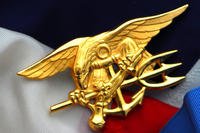ARLINGTON, Va. - More than 35,000 runners took part in the 29th Annual Army 10-Miler Sunday marking the biggest turnout for the run in its nearly 30-year history. But, for one runner taking part in the event, it marked a different sort of milestone.
For retired Command Sgt. Maj. Al Hunt Jr., who from 1976-1978 served as the first sergeant major of the Army National Guard, the day also marked his 80th birthday. To mark the occasion, Hunt ran this year’s course with Command Sgt. Maj. Brunk W. Conley, the current sergeant major of the Army Guard, as well as soldiers assigned to the Army National Guard Readiness Center.
“Today is my 80th birthday,” said Hunt after the race. “I ran ten miles and I finished. It’s an experience that everybody needs to challenge themselves.”
Hunt finished the course in just under three hours, but it wasn’t his first time taking part in the 10-Miler. In 1994 he ran in the 10th 10-Miler and has also taken part in a number of marathons as well. Running, for Hunt, goes back more than six decades.
“I started running in high school to become part of a team that could challenge you both physically and mentally,” he said. “It also provided individual measurements of ones limits.”
And testing your limits was one of the reasons Hunt said he chose to run in this year’s 10-Miler. Age alone presented Hunt with limits to test, made even more challenging, many may say, as Hunt is visually impaired and legally blind.
“When you’re hearing impaired or visually impaired you don’t ever let that stop you,” Hunt said. “You can overcome.”
Hunt, however, said there were others who kept him motivated.
“The people that really inspired me were the wounded warriors,” he said. “I mean, they’re coming back with limbs missing. It’s just a generation of “you can do anything.” All you have to do is just step out and do it.”
Hunt said that this was his way of stepping out and doing it.
“You see all these people around you and they’re doing things with no limbs,” he said. “They’re accomplishing something so I figured I might be blind, I might be deaf but I’m gonna do it. “
It also represented a homecoming of sorts for Hunt.
“My kids used to run with me. When I was stationed here at the Pentagon and lived on Fort Myer, we used to run these same bridges and around all these monuments,” he said. “It was a challenge to come back here and do it again.”
It was also a homecoming in other ways as well.
“It means that I had returned and experienced running with a team and that’s what the Guard is all about,” he said.
And for Conley, it was a chance to reconnect with the Army Guard’s past as a way to shape the future.
“The back of the [Army Guard 10-Miler] shirt says ‘a tradition of excellence,’ but excellence has to start with the first,” said Conley. “You can’ t start until the first gets the ball rolling in the right direction. You’re looking at where excellence started. Everybody that has followed on since then has built on that tradition of excellence.”
And watching Hunt take part and complete the event, for some, served as a way to inspire that tradition of excellence in others.
“They say running is 90 percent mental, and I strongly believe that,” said Army Capt. Emilygrace Mate, who headed up the 10-Miler teams and the Army Guard’s participation in the event. “I think it’s a tremendous feat what he just did and gives us the motivation, especially for those of us that aren’t runners, to go out next year and run. I think it’s tremendous that he came out here and ran and set the standard for everyone.”
This year’s event also saw a large turnout for runners from the Army Guard.
“We had 2025 runners registered, last year we had 1,500 registered, so that was a big increase for us this year,” said Mate, adding that the Guard also had two teams —one male team and one female team — running the 10-Miler competitively with both teams taking second place in their respective divisions.
And for Hunt, it all comes back to preparing for and accepting the challenge.
"I started [preparing for the 10-Miler] in December because you need to at least do 10 months preparation,” said Hunt, who previously coached both child0 and adult runners. “You can’t just go out and start running. Even at that pace and that amount of training I still had muscle cramps but that’s just normal. You get to a certain age and you just expect that to happen. But, you just don’t quit. That’s what this is all about.”
And Conley, the tenth Army Guard sergeant major, said he has similar challenge in mind.
“I hope that when I’m 80 I can run with the 20th sergeant major of the Army Guard,” he said.
The chance to run with Hunt was an exceptional experience, said Conley.
“It was a pleasure. It was an honor,” he said.



























